|
|
|
Sort Order |
|
|
|
Items / Page
|
|
|
|
|
|
|
| Srl | Item |
| 1 |
ID:
181129
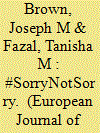

|
|
|
|
|
| Summary/Abstract |
States accused of perpetrating cyber operations typically do not confirm or deny responsibility. They issue ‘non-denial denials’ or refuse to comment on the accusations. These ambiguous signals are prevalent, but they are largely ignored in the existing cyber literature, which tends to treat credit claiming as a binary choice. The ambiguity of non-denial denials and ‘non-comments’ allows states to accomplish two seemingly opposed goals: maintaining crisis stability and leaving open the possibility of their involvement in the attack. By deliberately remaining a suspect, a state can manipulate rivals’ perceptions of its cyber capability and resolve. Refusing to deny responsibility can also shape rivals’ perceptions of allies’ capabilities, enhancing the credibility of deterrence. All of this can be accomplished without the escalatory risks that would come with an explicit admission of responsibility. Where previous research has focused on the dangers of escalation and the limitations of costly signalling with cyber, we show that non-denial denials and non-comments make cyber operations considerably more useful than the literature appreciates.
|
|
|
|
|
|
|
|
|
|
|
|
|
|
|
|
| 2 |
ID:
181128
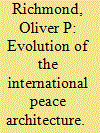

|
|
|
|
|
| Summary/Abstract |
The theories and doctrines related to peacekeeping, mediation, peacebuilding, and statebuilding, as well as other tools used to end war and conflict, raise a range of long-standing questions about the evolution and integrity of what might be called an international peace architecture. A narrow version of this term has begun to appear in the context of peacebuilding through the United Nations, the African Union, the European Union, other regional actors, the international legal system, and the International Financial Institutions. This article proposes a much broader, historical version, with six main theoretical stages, which have, from a critical perspective, produced a substantial, though fragile, international architecture.
|
|
|
|
|
|
|
|
|
|
|
|
|
|
|
|
| 3 |
ID:
181133
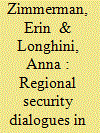

|
|
|
|
|
| Summary/Abstract |
The term regional security dialogue brings to mind state-organised conferences and events; however, an under-appreciated subset of such dialogues are organised by non-state actors that have unique formal aspects. These quasi-formal dialogues operate alongside, and sometimes in competition to, state-sanctioned processes. Why do some of these forums appear to be more effective at fostering regional dialogue than strictly formal or informal processes with the same goals? Drawing from heterogenous discourse approaches, we address this question by identifying and expanding the concept of the quality of discursive space, as a key feature for the success of security dialogues. We then apply this concept to two of the most successful so-called Track 1.5 security dialogues: the Munich Security Conference (MSC) in Europe and the Shangri-La Dialogue (SLD) in Asia. We analyse these cases using a mix of interviews with participants and organisers, participant observation, and public outputs with the aim of improving the understanding of the role and impact of Track 1.5 diplomacy in the practice of international security. Our findings highlight that it is what we call the quality of discursive space, as a mix of different components in this space, which differentiates effective dialogues from mere policy ‘talk shops’.
|
|
|
|
|
|
|
|
|
|
|
|
|
|
|
|
| 4 |
ID:
181131
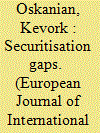

|
|
|
|
|
| Summary/Abstract |
This article contributes a securitisation-based, interpretive approach to state weakness. The long-dominant positivist approaches to the phenomenon have been extensively criticised for a wide range of deficiencies. Responding to Lemay-Hébert's suggestion of a ‘Durkheimian’, ideational-interpretive approach as a possible alternative, I base my conceptualisation on Migdal's view of state weakness as emerging from a ‘state-in-society's’ contested ‘strategies of survival’. I argue that several recent developments in Securitisation Theory enable it to capture this contested ‘collective knowledge’ on the state: a move away from state-centrism, the development of a contextualised ‘sociological’ version, linkages made between securitisation and legitimacy, and the acknowledgment of ‘securitisations’ as a contested Bourdieusian field. I introduce the concept of ‘securitisation gaps’ – divergences in the security discourses and practices of state and society – as a concept aimed at capturing this contested role of the state, operationalised along two logics (reactive/substitutive) – depending on whether they emerge from securitisations of the state action or inaction – and three intensities (latent, manifest, and violent), depending on the extent to which they involve challenges to state authority. The approach is briefly illustrated through the changing securitisation gaps in the Republic of Lebanon during the 2019–20 ‘October Uprising’.
|
|
|
|
|
|
|
|
|
|
|
|
|
|
|
|
| 5 |
ID:
181130


|
|
|
|
|
| Summary/Abstract |
Until it was destroyed in a fire in September 2020, Moria camp on the island of Lesvos, Greece, was widely referred to as ‘a living hell’. This article investigates the causes and effects of poor camp conditions from the perspectives of humanitarian actors who have worked in the camp. We argue that poor conditions are intended to perform a deterrent function for both migrants and humanitarian actors. We also argue, however, that such camps are not simply static manifestations of violent borderwork, but complex, dynamic sites of struggle in which those who live and work there continuously make and remake the camp. This can be seen, for instance, in the ways in which humanitarian actors simultaneously fill the gap resulting from the violent inaction of the state while contributing to poor camp conditions, as a result of inter-agency competition and criticism, and the broader ways in which they challenge and reinforce the violent governance of migration.
|
|
|
|
|
|
|
|
|
|
|
|
|
|
|
|
| 6 |
ID:
181132
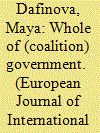

|
|
|
|
|
| Summary/Abstract |
Whole-of-government (WOG) approaches have emerged as a blueprint for contemporary peace and state-building operations. Countries contributing civilian and military personnel to multinational interventions are persistently urged to improve coherence and enhance coordination between the ministries that form part of the national contingent. Despite a heated debate about what WOG should look like and how to achieve it, the causal mechanisms of WOG variance remains under-theorised. Based on 47 in-depth, semi-structured interviews, this study compares Swedish and German WOG approaches in the context of the International Security Assistance Force (ISAF). I argue that coalition bargaining drove the fluctuation in the Swedish and German WOG models. Strategic culture was an antecedent condition. In both cases, COIN and the war on terror clashed with foundational elements of the Swedish and German strategic cultures, paving the way for a non-debate on WOG on the political arena. Finally, bureaucratic politics was an intervening condition that obstructed or enabled coherence, depending on the ambition of the incumbent coalition government to progress WOG. Overall, the results suggest that coalitions face limitations in implementing a WOG framework when the nature of the military engagement is highly disputed in national parliaments.
|
|
|
|
|
|
|
|
|
|
|
|
|
|
|
|
|
|
|
|
|